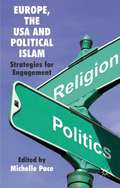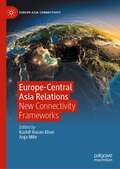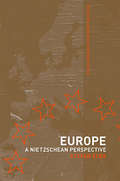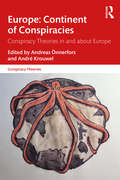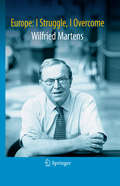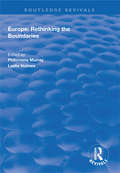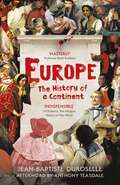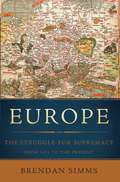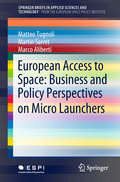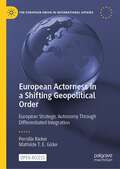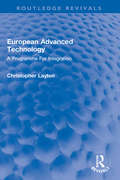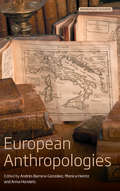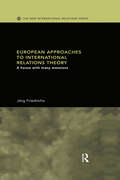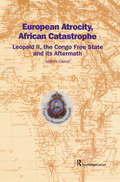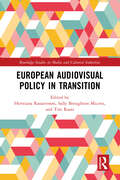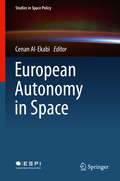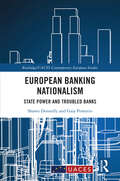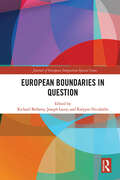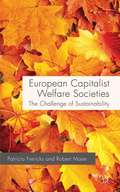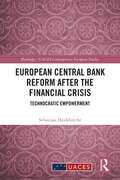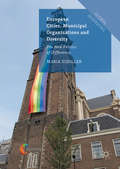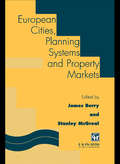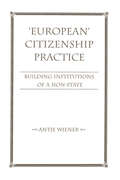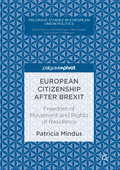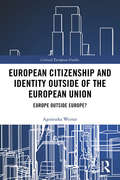- Table View
- List View
Europe, the USA and Political Islam
by Michelle PaceA study of the attempts by the US and EU to develop meaningful political relations with Islamist movements in the Middle East and Balkans. The contributors draw on extensive research on Islamist parties and movements and Western policy towards them over the past decade.
Europe-Central Asia Relations: New Connectivity Frameworks (Europe-Asia Connectivity)
by Anja Mihr Kashif Hasan KhanThis book addresses the current state of economic and political development within Central Asia and the importance of European countries and organizations as international actors and supranational organizations for the Central Asian Region (CAR). It aims to provide a better understanding of Central Asia’s multi-faceted relations in rapidly evolving geostrategic dynamics and serves as a timely insight into the contours of Central Asian states’ policies, emerging trends, and significant features of these interactions. The aim is to analyze the main challenges for future between the Europe and Central Asia relations, to make recommendations for improvement, and to identify lines for future research on this matter. It highlights key aspects of current discourses in CAR vis-à-vis the role of European countries and China and other key players. It explores post-Soviet scenarios, considering recent drastic changes in the equation of international relations in general and, more particularly the role of Russia and China vis-à-vis Europe in the CARs. This book covers the different perspectives on the EU’s new strategy (2019), which will contribute to strengthening relations between the two growing regions. It will be beneficial for academics, practitioners, and policymakers.
Europe: A Nietzschen Perspective (Routledge Advances in European Politics #Vol. 11)
by Stefan ElbeThere has been a deliberative, but as yet unsuccessful, attempt by scholars and policy makers to articulate a more meaningful idea of Europe, which would enhance the legitimacy of the European Union and provide the basis for a European identity. Using a detailed analysis of the writings of Nietzsche, Elbe seeks to address this problem and argues that Nietzsche's thinking about Europe can significantly illuminate our understanding. He demonstrates how Nietzsche's critique of nationalism and the notion of the 'good European' can assist contemporary scholars in the quest for a vision of Europe and a definition of what it means to be a European citizen.
Europe: Conspiracy Theories in and about Europe (Conspiracy Theories)
by dreas Önnerfors and André KrouwelThis edited volume investigates for the first time the impact of conspiracy theories upon the understanding of Europe as a geopolitical entity as well as an imagined political and cultural space. Focusing on recent developments, the individual chapters explore a range of conspiratorial positions related to Europe. In the current climate of fear and threat, new and old imaginaries of conspiracies such as Islamophobia and anti-Semitism have been mobilised. A dystopian or even apocalyptic image of Europe in terminal decline is evoked in Eastern European and particularly by Russian pro-Kremlin media, while the EU emerges as a screen upon which several narratives of conspiracy are projected trans-nationally, ranging from the Greek debt crisis to migration, Brexit and the COVID-19 pandemic. The methodological perspectives applied in this volume range from qualitative discourse and media analysis to quantitative social-psychological approaches, and there are a number of national and transnational case studies. This book will be of great interest to students and researchers of extremism, conspiracy theories and European politics.
Europe: I Struggle, I Overcome
by Wilfried MartensWilfried Martens - Europe: I Struggle, I Overcome Foreword by Angela Merkel Wilfried Martens has devoted his entire life to politics: as student leader, youth activist, President of the Flemish Christian Democrats, Prime Minister of Belgium, President of the European People's Party and European statesman. In his autobiography Martens offers the inside story on running a complex country like Belgium, fighting for European integration and unification, and transforming the European People's Party into a strong, united centre-right movement and leading European political family. Above all, this is a book about the intricacies of European politics and its guiding ideas, values and principles.
Europe: Rethinking the Boundaries (Routledge Revivals)
by Leslie Holmes Philomena MurrayFirst published in 1999, Europe: Rethinking the Boundaries explores the themes of boundary and identity from cultural, political, sociological and historical perspectives. The volume highlights the multiplicity of approaches and the complexity of the understanding of what is Europe, while at the same time presenting a coherent theme of boundary which is both thought-provoking and comprehensive. It focuses on Europe’s changing boundaries and the "clash of civilisations" thesis, the European transformation of the nation state, rethinking European peripheries and European Union (EU) enlargement, the Mediterranean boundaries of the EU, Balkan boundaries, Europe and the "Islamic threat", German foreign policy and European security, and the neutrality of Austria, Finland and Sweden in the EU. Europe: Rethinking the Boundaries will appeal both to informed generalists and to students and scholars of Europe who seek an analysis of the issue of boundaries from a variety of perspectives. It is a timely collection of up to date commentary and analysis from a team of experts which provides a fresh approach to the discussion of boundaries in Europe. It points to pressing issues facing Europe at a difficult and challenging time.
Europe: The Enlightening History of a Continent
by Jean Baptiste DuroselleWhether as an epic battleground or a cradle of civilizations, Europe has left an enduring imprint on the history of the world for over two millennia. From megalithic civilizations through ancient times, the Renaissance, the Industrial Revolution, the rise of nationalism, two world wars and the years that followed, this book looks beyond a series of distinct national histories to offer the history of Europe as an often shared experience across one continent. This book delves into events such as the fall of the Berlin Wall, traces the continents evolution from the collapse of Communism through the Iraq War, global financial crisis, Brexit and Russia's invasion of Ukraine. And then looking forward, it explores what would be necessary for the continent to remain a global power-player for years to come.
Europe: The Struggle for Supremacy, from 1453 to the Present (New Approaches To European History Ser. #19)
by Brendan SimmsIf there is a fundamental truth of geopolitics, it is this: whoever controls the core of Europe can control the entire continent, and whoever controls all of Europe can dominate the world. Over the past five centuries, a rotating cast of kings and conquerors, presidents and dictators have set their sights on the European heartland, desperate to seize this pivotal area or at least prevent it from falling into the wrong hands. From Charles V and Napoleon to Bismarck and Cromwell, from Hitler and Stalin to Roosevelt and Gorbachev, nearly all the key power players of modern history have staked their titanic visions on this vital swath of land.In Europe, prizewinning historian Brendan Simms presents an authoritative account of the past half-millennium of European history, demonstrating how the battle for mastery there has shaped the modern world. Beginning in 1453, when the collapse of the Byzantine Empire laid Europe open to Ottoman incursion and prompted the dramatic expansion of the Holy Roman Empire, Simms leads readers through the epic struggle for the heart of Europe. Stretching from the Low Countries through Germany and into the North Italian plain, this relatively compact zone has historically been the richest and most productive on earth. For hundreds of years, its crucial strategic importance stoked a seemingly unending series of conflicts, from the English Civil War to the French Revolution to the appalling world wars of the 20th century. But when Europe is in harmony, Simms shows, the entire world benefits--a lesson that current leaders would do well to remember.A bold and compelling work by a renowned scholar, Europe integrates religion, politics, military strategy, and international relations to show how history--and Western civilization itself--was forged in the crucible of Europe.
European Access to Space: Business and Policy Perspectives on Micro Launchers (SpringerBriefs in Applied Sciences and Technology)
by Marco Aliberti Matteo Tugnoli Martin SarretThe book provides an analysis of the dynamics of the global launch service market associated with small satellites, by placing a particular focus on its unfolding trends and future outlook.From an economic perspective, the emergence of numerous micro launcher initiatives on top of already existing launch solutions for small satellites raises questions about the specific nature and size of the small satellite market that will - or could - be addressed by these emerging launch services offerings. Identifying the specific features of such market by characterizing customers' expectations and providing a competitive analysis of the different launch solutions for small satellites is the second objective of this report.Finally, and from a policy perspective, the book reflects on whether such market could and should be handled on a purely private basis in the European context, or on the contrary generates relevant stakes that compels European institutional actors to become more actively involved in this domain.
European Actorness in a Shifting Geopolitical Order: European Strategic Autonomy Through Differentiated Integration (The European Union in International Affairs)
by Pernille Rieker Mathilde T. GiskeThis is an open access book. With the unprovoked Russian invasion of Ukraine, European security has been put on high alert. The implications of the Russian military invasion are many and difficult to grasp in full. However, the need for greater European strategic autonomy appears increasingly evident. The book argues that strategic autonomy may be reached—also in the short run—if differentiated integration is seen as an asset rather than a challenge. While the EU (together with NATO) remains the core in such a system, there is a multitude sub-regional integration processes that need to be taken into account to get the full idea of how European strategic autonomy can be achieved.
European Advanced Technology: A Programme For Integration (Routledge Revivals)
by Christopher LaytonFirst published in 1969, European Advanced Technology expounds a programme of action for Europe to tackle the challenge posed by American technology in the 1960s. It analyses first the nature of the American predominance in science and technology and goes onto describe the efforts of the major European states to counter it on their own. It then explains the limitations of these efforts at the level of the nation state and shows how European countries have gone on to work together in certain key sectors: high energy physics, nuclear power, aircraft, space, electronics, transport and communications. The history of these programmes is examined carefully and the book describes a wider strategy. It deals with larger questions like how Europe can develop a common science and technology policy; what should be done to promote industrial integration and European companies, and what individual companies and the British government can and should do? This book will be an essential read for scholars and researchers interested in the history of European Union, European history, international organisations and European Politics.
European Anthropologies
by Andrés Barrera-González Monica Heintz Anna HoroletsIn what ways did Europeans interact with the diversity of people they encountered on other continents in the context of colonial expansion, and with the peasant or ethnic 'Other' at home? How did anthropologists and ethnologists make sense of the mosaic of people and societies during the nineteenth and twentieth centuries, when their disciplines were progressively being established in academia? By assessing the diversity of European intellectual histories within sociocultural anthropology, this volume aims to sketch its intellectual and institutional portrait. It will be a useful reading for the students of anthropology, ethnology, history and philosophy of science, research and science policy makers.
European Approaches to International Relations Theory: A House with Many Mansions (New International Relations)
by Jörg FriedrichsA well-established community of American scholars has long dominated the discipline of international relations. Recently, however, certain strands of continental theorizing are being introduced into the mainstream. This is a critical examination of European approaches to international relations theory, suggesting practical ways of challenging manistream thought. Freidrichs presents a detailed sociological analysis of knowledge production in existing European IR communities, namely France, Italy and Scandinavia. He also discusses a selection of European schools and approaches.
European Atrocity, African Catastrophe: Leopold II, the Congo Free State and its Aftermath
by Martin Ewans Sir Martin EwansThere is a broad consensus among those who are concerned with Africa that the plight of the continent is approaching the catastrophic. Partly the roots of the problem are historical, stemming from the exploitation and colonisation of the continent by European powers. An appreciation of the history of the relationship between Europe and Africa, a major episode of which this book examines, is indispensable to an understanding of the continent's present predicament. In the late 19th and early 20th centuries King Leopold II of the Belgians established a colony in Africa, which, as the Congo Free State, became a byword for unremitting exploitation and widespread atrocities. This book describes the creation, the development and the collapse both of this regime and of the Belgian colony that replaced it. Conclusions are drawn about the nature of European colonialism in Africa and the consequences for Europe itself.
European Audiovisual Policy in Transition (Routledge Studies in Media and Cultural Industries)
by Heritiana Ranaivoson Sally Broughton Micova Tim RaatsThis book describes and critically addresses the innovations and shifts made in the revision of the Audiovisual Media Services Directive (AVMSD) adopted by the European Parliament and Council in 2018. Reflecting on European Union regulation and policy practice in all its Member States, the book’s unique approach places in-depth case study topics against the broader theoretical background. Taking a Europe-wide angle, an international team of authors focuses on key aspects of the AVMSD: the expansion of its scope to include video-sharing-platforms such as YouTube; the update of the rules for commercial communications; the first attempt for harmonized, minimal requirements at EU level regarding transparency of media ownership; new rules to ensure that video-on-demand services offer, invest in, and prioritise European content; the obligation on television distributors and smart TV manufacturers to pass on broadcasters’ signal without any interference, alteration or modification; and, the formalisation and consolidation of new forms of collaboration among national regulatory authorities. This thorough analysis of the cornerstone of European media policy makes this edited collection a crucial reference for scholars and students of media and cultural industries, media law and policy, European and EU media policy, and technology studies.
European Autonomy in Space
by Cenan Al-EkabiThe volume provides analyses and evaluations of the continuing importance of Europe's autonomy in its access to space as a key driver in the development of European space capabilities. From a detailed historical analysis of some of the pitfalls of dependence in the space industry, experts analyse the full range of current European space capabilities and identify areas where autonomy is both possible and required, even in a situation of severe budgetary constraints. The contributions present a comprehensive overview of European efforts in a broad range of areas including energy, culture, science, and security; access to space, space applications, human spaceflight, security and space situational awareness, and strategic issues. They make a cogent strategic and economic case for policy makers to continue to bear in mind the importance of autonomous space capabilities, even in an interdependent globalised world.
European Banking Nationalism: State Power and Troubled Banks (Routledge/UACES Contemporary European Studies)
by Shawn Donnelly Gaia PomettoThis book compares the different expressions of, and outcomes from, banking nationalism in two European countries to draw wider conclusions about the consequences for Banking Union in Europe and to show how national governments deal (or fail to deal) with international commitments. It reveals how and why one case – Spain – managed to tackle failing banks within EU Banking Union regulations even before they became written in EU law, while the other – Italy – had more persistent problems. The book argues that Spain demonstrates a successful case of liberal economic nationalism, typified by aggressive, early state intervention to restructure Spanish banks, and help from the European Stability Mechanism even in the face of local political opposition. Italy, meanwhile, suffered from the weaker, delayed intervention which forced it to confront European institutions with demands for special treatment as a means of externalizing its own internal weakness. This book will be of key interest to scholars, students and professionals in economic policy, Economic and Monetary Union and Banking Union in Europe, European and global governance, European/EU studies, European public policy, European public administration and EU law, as well as professionals working in the banking sector.
European Boundaries in Question (Journal of European Integration Special Issues)
by Richard Bellamy Joseph Lacey Kalypso NicolaïdisEuropean Union boundaries have always been unusual. In no other political community is both the prospect of enlargement and the ever-present possibility of withdrawal part of the constitutional framework. We find few other instances where some territories in a political community adopt a common currency while others do not. Examples of thick association agreements, such as we find between the EU and third countries like Switzerland and Norway, are uncommon. Over the last number of years, EU boundaries have been challenged like never before. Brexit poses a fundamental threat to the EU’s territorial integrity and the rights of EU citizens to cross what have been regarded as open borders; the refugee crisis and the increase of terrorism both call into question the EU’s ability to justly and effectively manage its external borders; the rise of populism is a direct challenge to internal free movement as the demand to reassert national borders becomes formidable; while the aftermath of the euro-crisis continues to put Monetary Union in doubt. By distinguishing between three categories of boundary change – boundary-making, boundary-crossing and boundary-unbundling – the authors in this volume attempt to shed light on the sustainability and legitimacy of Europe’s boundaries in question. The chapters originally published as a special issue in the Journal of European Integration.
European Capitalist Welfare Societies
by Patricia Frericks Robert MaierThis book offers an analysis of European capitalist welfare societies, centering on the questions of sustainability and the financing of social rights. Capitalism is defined as a multi-model economy, comprising of a market economy (including production, distribution and exchange), a state welfare economy (based on compulsory transfers, such as taxes and social contributions), a household economy and a voluntary economy. The resources for the welfare economy are produced by some activities of the life course, and used by other activities, once rights over these resources are acquired. Setting out a new conceptual framework that integrates an adapted version of the theory of instituted economic processes with the changing structuration of the life course in European countries, the book argues that European capitalist welfare societies are not sustainable in their present form and that the future financing of social rights is conditional on substantial transformations. The book also analyzes relevant data on the socio-economic positioning of women and migrants.
European Central Bank Reform After the Financial Crisis: Technocratic Empowerment (Routledge/UACES Contemporary European Studies)
by Sebastian HeidebrechtThis book explores the European Central Bank’s (ECB) political role, and the politics of its increased empowerment, in the light of contemporary challenges for both central bank independence and European democratic stability.Analysing the central bank’s transparency, accountability, and democratic legitimacy, the book shows how politics have influenced monetary policy, the ECB’s institutional role, and the appointment of top central bankers. As one of the most important institutions of the European Union (EU), the economic empowerment of this very independent and technocratic institution poses unsolved challenges for its accountability and for democratic legitimacy of the EU.This book will be of key interest to scholars and students of European integration, European economic governance, democracy, political economy, economics, and law.
European Cities, Municipal Organizations and Diversity
by Maria SchillerThis book challengesthe prevailing view that local authorities are irrelevant in immigrationpolicy-making. Presenting an in-depth ethnographic study of the recentimplementation of local 'diversity policies' in the Netherlands, Belgium andUnited Kingdom, it identifies a new politics of difference, characterized by a'paradigmatic pragmatism'. Building on extensive fieldwork in Amsterdam,Antwerp and Leeds, the author shows that, rather than simply replacing anearlier politics of difference, local diversity policies combine ideals ofmulticulturalism, assimilation and diversity. She links these findings to theongoing modernization and diversification of municipal authorities, and theimpact of this transformation on the profile of the bureaucrats and theirimplementation of diversity policies. This thought-provoking work will appealto students, researchers and practitioners engaged in the fields ofimmigration, diversity and multiculturalism.
European Cities, Planning Systems and Property Markets
by James Berry Stanley McGrealA common theme running through both the market economies of Western Europe and the old command economies of Eastern Europe is the desire to combine local economic development objectives with those of the international investor. It is in this context that the interaction between planning systems and property markets is of paramount importance.
European Citizenship Practice: Building Institutions Of A Non-state
by Antje WienerAlthough great efforts have been made to understand citizenship, it has remained a contested concept, largely because of the problem of the changing relationship between citizens and their community of membership or belonging. The European Union poses the most recent and dramatic change to this definition of citizenship. Arguing that citizenship must be explored from a perspective that takes this continual change into account, Antje Wiener develops the concept of citizenship practicethe process of policymaking and/or political participation which contributes to creating the terms of citizenship. The approach draws on both comparative social-historical literature on the state and the new historical institutionalism in European integration theories. European Citizenship Practice advances a discursive analysis of citizenship practice based on these related bodies of literature, which lie at the heart of this important contribution to citizenship studies. }Although great efforts have been made to understand citizenship, it has remained a contested concept, largely because of the problem of the changing relationship between citizens and their community of membership or belonging. The European Union poses the most recent and dramatic change to this definition of citizenship. Arguing that citizenship must be explored from a perspective that takes this continual change into account, Antje Wiener develops the concept of citizenship practicethe process of policymaking and/or political participation which contributes to creating the terms of citizenship. The approach draws on both comparative social-historical literature on the state and the new historical institutionalism in European integration theories. European Citizenship Practice advances a discursive analysis of citizenship practice based on these related bodies of literature, which lie at the heart of this important contribution to citizenship studies. }
European Citizenship after Brexit
by Patricia MindusThis book is open access under a CC BY 4. 0 license. This book investigates European citizenship after Brexit, in light of the functionalist theory of citizenship. No matter its shape, Brexit will impact significantly on what has been labelled as one of the major achievements of EU integration: Citizenship of the Union. For the first time an automatic and collective lapse of status is observed. It is a form of involuntary loss of citizenship en masse, imposed by the automatic workings of the law on EU citizens of exclusively British nationality. It does not however create statelessness and it is likely to be tolerated under international law. This loss of citizenship is connected to a reduction of rights, affecting not solely the former Union citizens but also second country nationals in the United Kingdom and their family members. The status of European citizenship and connected rights are first presented. Chapter Two focuses on the legal uncertainty that afflicts second country nationals in the United Kingdom as well as British citizens, turning from expats to post-European third country nationals. Chapter Three describes the functionalist theory and delineates three ways in which it applies to Brexit. These three directions of inquiry are developed in the following chapters. Chapter Four focuses on the intension of Union citizenship: Which rights can be frozen? Chapter Five determines the extension of Union citizenship: Who gets to withdraw the status? The key finding is that while Member states are in principle free to revoke the status of Union citizen, former Member states are not unbounded in stripping Union citizens of their acquired territorial rights. Conclusions are drawn and policy-suggestions summed up in the final chapter.
European Citizenship and Identity Outside of the European Union: Europe Outside Europe? (Critical European Studies)
by Agnieszka WeinarThis book critically engages with the concept of European identity and citizenship, and the role of the European Union in diaspora, membership and emigration policies. It presents original research on European governance of emigration and citizenship and considers European integration in a global context. It questions whether there can be a European diaspora outside the European Union, if European governance of emigration is possible, and whether the EU can or should govern its diasporas in the global era. By engaging with concepts of European citizenship, diaspora and identity, the author examines the weak meaning of Europe for EU nationals living abroad and finds that European public spaces, present and sustained within the European Union territory, are largely not exported outside of it. Equal treatment and equal rights become empty concepts for Europeans leaving the European Union as they lose their European citizenship. This book will be of key interest to scholars and students of European Union politics, European studies, migration studies, American and Canadian studies, and the sociology of migration.
